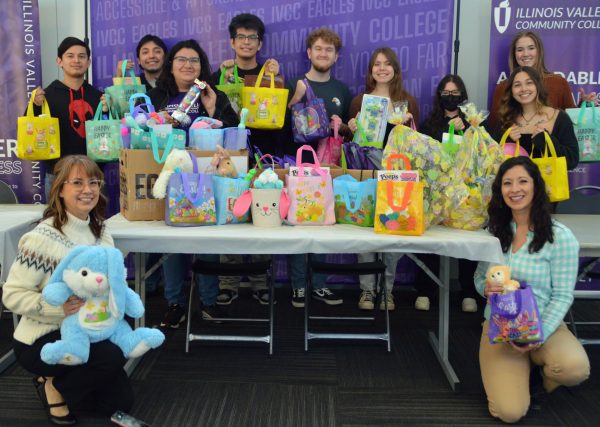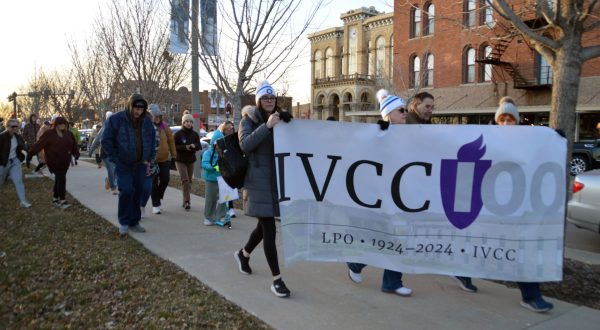Support staff petition to unionize approved, next looking to bargain
IVCC support staff are one step closer to unionizing after learning April 24 that the college will not challenge their petition.
With the unionization of staff, these 44 employees would possess a bargaining tool to negotiate future salary, benefits, and working conditions with administration.
Staff previously relied on receiving benefits similar to those of the already unionized faculty, represented through Illinois Federation of Teachers Local 1810. This pattern changed with the faculty negotiations of fall 2014, union supporters said, where a difference in wage and insurance policy emerged.
At the April 24 meeting including college representatives Jerry Corcoran, IVCC president, Cheryl Roelfsema, president for business services and finance, Deborah Anderson, vice president for academic affairs, and Walter Zukowski, board attorney, it was announced that the college position had changed and IVCC would not challenge the formation of a staff union.
Prior to this date, staff union organizers and the college administration had met several times, but had not come to an agreement on the union. The staff then filed a petition on March 26 with the state Illinois Educational Labor Relations Board to form a union.
The staff unit is now expected to sign the petition certified by the labor board sometime in late May, according to Ray Roskos, IFT field service director.
Roskos was approached by Rebecca Donna, faculty union president, earlier this year after several members of the support staff notified Donna that they were interested in information regarding union formation. Both Roskos and Donna were present at the April 24 meeting to represent the staff.
In addition to the faculty union, IVCC facilities workers are represented by the Service Employees Union. Support staff unionization would mean some staff are joining a majority of IVCC employees who are already unionized.
“With state funding the way it is, colleges are changing the way things happen for them,” Roskos said. “Without a union, it’s take it or leave it.”
Theresa Bowen, an administrative assistant for Project Success, has been an organizer in the unionizing process. She expressed that unionizing will strengthen the future of the college and its workers.
“Being able to have a voice in the bargaining process enhances a company ‒ it’s a really viable solution to things,” Bowen said.
She emphasized the importance of the structure of a strong union as a neater, cleaner way to negotiate, sans-favoritism: “This is something that will benefit young people, the future staff of IVCC, because they will get current wages and benefits.”
Polly Ragazinky, an administrative assistant for Heath Professions, expressed views similar to Bowen ‒ having a union would allow staff to have a stronger collaborative voice and general job security.
Both Bowen and Ragazinky were members of support staff who initially expressed interest in the union.
According to Roskos, approval to file a unionization petition with the labor board involved receiving signed union authorization cards from a majority of support staff. These cards gave the IFT permission to represent them as their sole bargaining agent, and that the staff would allow them to file any petition necessary to have the union approved.
Although some staff members who initially signed authorization cards asked to have them revoked later in the process, Roskos said a majority number was still reached.
Expressing skepticism towards the majority agreement was Jennifer Scheri, coordinator for the Business Training Center. Scheri said due to the number of cards revoked, she did not believe a majority number had been reached prior to the petition filing on March 26.
“IVCC has been very generous with the benefits afforded to support staff,” said Scheri, who spoke positively of her 22 years of experience as an employee. “The college has consistently treated staff very well, and provides a friendly, safe, and fair work environment.”
Scheri said that with the formation of the union, she believed the free, open communication with her supervisor would be compromised, as she would no longer be able to be directly involved in situations regarding her employment. “I don’t feel the need to fix what isn’t broken,” she said in an interview before the college decided that it would not oppose the staff union.
Bowen said that she encourages all staff to look at the facts and make their decision of whether or not to support the union. As the wife of a retired union ironworker who refers to herself as “Mother Jones, the union organizer,” she said she acknowledges the presence of a prevalent personal side to each stance.
Those who did not sign authorization cards in support of the union will be considered non-members after the state certification. Non-members will be represented and bargained for through the union according to Roskos.
Roskos said that following the signing of the certified unit, support staff who have joined the union will have a collective say in forming a constitution, writing bylaws, holding officer elections, and beginning to bargain their official contract.





